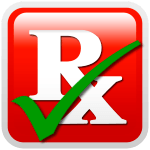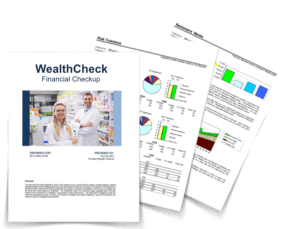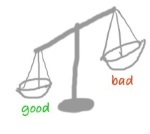All pharmacists are familiar with drug interactions – the situation where one drug interferes with the effectiveness of another drug. In fact, protecting patients from drug interactions is a cornerstone of the entire pharmacy profession. As pharmacy chain Rexall puts it; “It’s vital that the medications you’re taking are compatible with each other… to help you reach your health targets and goals.” (1)
Did you know there is a similar phenomenon in wealth management? I call it “money interactions.” Like medications, your financial choices should work together without any complications. And just like medications, your financial choices can sometimes interact negatively, especially if you don’t have a coordinated plan in place.
It seems strange, but I’ve found many parallels between pharmacy and money management. (In another article, I show how pharmacists can use their smoking cessation skills to become better investors).
In this case, the common solution is to identify and eliminate any negative interactions that can hurt your long-term goals.
MedsChecks is What Inspired Us
 Pharmacists have been helping patients avoid harmful interactions since the dawn of drugs. Medication reviews (or MedsChecks) is one process that takes a coordinated look at a patients’ meds, to make sure everything is working together for the greater good.
Pharmacists have been helping patients avoid harmful interactions since the dawn of drugs. Medication reviews (or MedsChecks) is one process that takes a coordinated look at a patients’ meds, to make sure everything is working together for the greater good.
The same is true for money. The best way to make sure your financial decisions are working well together is to take a coordinated view of your entire situation. Our new WealthCheck for Pharmacists is one way to accomplish this.
Inspired by the medication review process, WealthCheck is a financial check-up that looks at your entire situation to help you better achieve your goals. It looks for synergies among your financial goals to help you achieve success faster. It also looks for any conflicts that can slow down your progress.
A big picture, coordinated plan helps you see mistakes – and quick fixes.

I’ve seen several bad money interactions over the years. Here is a list of the most common ones:
#1. Spending not in line with long-term goals:
One of the areas I focus on is cash flow. This is to make sure a client is not spending more money than they are taking in. A negative cash flow means there is no way you can meet your long-term goals, so it’s important to get a good handle on your income and expenses.
The simple exercise of writing down all your monthly expenses may be time consuming, but it’s the best way to identify quick-fixes. For example, you may find you can eliminate a couple of restaurant dinners each month without too much difficulty.
#2. Expensive loans that sabotage savings plans:
 I often see the benefits of a good saving plan eroded by expensive loans. For example, I recently showed a client that the benefits of her Tax Free Savings Account (TFSA) were completely wiped out by the interest costs on her line-of-credit (LOC).
I often see the benefits of a good saving plan eroded by expensive loans. For example, I recently showed a client that the benefits of her Tax Free Savings Account (TFSA) were completely wiped out by the interest costs on her line-of-credit (LOC).
Most solutions here are quick-fixes, too. In the TFSA example above, we reallocated all the TFSA money to paying off the LOC faster. After that, we rebooted the TFSA without the expensive loan dragging it down.
#3. Ignoring taxes:
Taxes are the grim reaper of money that everyone wants to forget. But ignoring taxes is a big (and common) mistake. A little tax planning can pay you huge dividends over the long-run.
A common mistake I see is ignoring the taxes owed on all RRSPs. Pharmacists are in a high tax bracket, so putting money into an RRSP is a good strategy. But too much of a good thing can be bad.
Think of it this way: You make an RRSP contribution and get a nice tax refund. That refund is actually a “tax loan” you have to pay back in the future. A good tax plan can reduce the size of the tax loan you need to pay back. A bad tax plan (i.e. ignoring the situation) can result in a massive tax hit down the road.
#4. Protecting the wrong assets:
Most people agree with the principle of protecting your valuable assets. But in practice, many people seem to get this wrong.
As we saw in a previous article, the most valuable asset most pharmacists have is their earnings potential. However, many pharmacists I find don’t adequately protect their earnings with enough life or income replacement insurance.
On the flip side, I find many types of unnecessary insurance. For example, I think things like TV repair insurance, mortgage insurance, and accidental death and dismemberment (AD&D) insurance to be a waste of money.
A Final Word
A coordinated financial plan will help you define your goals, and show you how to achieve those goals. There is also a psychological benefit.
According to a Certified Financial Planning Board (CFP) survey, 52% of those with a comprehensive plan feel “very confident” about managing money, savings and investments, while just 30% of those without do.
I often see this first hand. After completing several WealthChecks recently, I see the confidence it creates in my pharmacy clients. I’m sure its the same for patients who do a medscheck and get a good understanding of their health targets and goals.
References: (1) http://www.rexall.ca/services/medscheck




